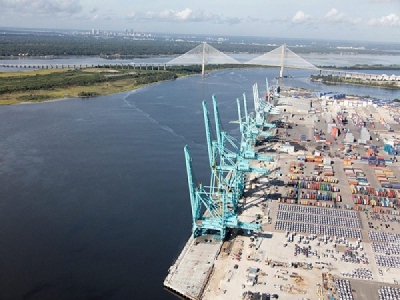
Posted on March 13, 2017
By Reynolds Hutchins, JOC.com
Jacksonville Port Authority CEO Brian Taylor has resigned, giving no reason for the sudden departure, as the Northeast Florida port gauges whether it should encourage its top Asian container terminal to move in order to reduce the cost of deepening to better handle mega-ships.
Taylor’s resignation is the second unexpected departure of a Jacksonville chief executive in just four years and comes as the port considers whether to push its TraPac terminal to move from Dames Point to Blount Island, cutting anywhere from $150 million to $200 million off the $684 million dredging project. Although Southeast ports Savannah and Charleston are farther along on their own deepening projects, Jacksonville has still managed to outpace the two in the rate of Asian business growth, according to an analysis of data from PIERS, a sister division of JOC.com.
The port authority is planning to find a permanent replacement for Taylor but, until then, Jacksonville’s senior government affairs director Eric Green will take on the post in the interim. The authority nor Taylor were available for immediate comment on the reason the departure.
In a statement, the port authority commended Taylor his achievements during his four-year tenure, including fixing a navigational hazard for cargo ships at Mile Point; completing an on-dock rail facility serving the port’s Blount Island and Dames Point Terminals; winning a bid to become Volkswagen’s main Southeast port, a title that originally belonged to Georgia’s Port of Brunswick; and implementing berth, dock, rail, and crane upgrades.
The port also managed to grab a larger share of the Asian imports being moved through US East Coast ports. Under Taylor, Asian imports were the fastest-growing segment of the port’s business. Jacksonville’s share of the East Coast’s Asian import market grew from 1.66 percent the year before Taylor was hired to 3.66 percent in 2016. Jacksonville and other smaller Southeast ports have been making inroads grabbing market share from heavyweight competitors. Savannah, the Southeast’s market leader, handled 26.35 percent of the East Coast Asian import market in 2016, down from 27.13 percent a year prior. Farther north, Charleston handled 8.27 percent, up from 7.38 percent.
Efforts to grow that share further could be curbed if Jacksonville is not able to complete its ongoing harbor deepening project. By deepening its channel from 40 feet to 47 feet, the Florida port hopes to attract ship with capacities of up to 14,000 twenty-foot-equivalent units able to pass through the larger Panama Canal locks. But shouldering the cost of the $684 million dredging project has been a challenge for port authority personnel.
Green and Taylor played critical roles securing authorization, but were unable to secure federal appropriation for the project. The port authority did include $46.6 million in its operating budget to begin the dredging work — $31.6 million from the state and $15 million in port financing — but the hope now is that more dollars will come from the state. In the meantime, Jacksonville port officials have been attempting to drive down the cost of the project, an effort that would require a key tenant, the port’s TraPac terminal, to relocate.
Relocating TraPac to a former APM Terminals facility on Blount Island, roughly a mile and a half away from the current Dames Point TraPac terminal, would cut $150 million to $200 million in deepening costs off the project.
TraPac, a unit of Mitsui OSK Lines, and the Jacksonville Port Authority are discussing the possibility of the terminal operator moving closer to the ocean.
The port authority has said TraPac could leave if it can’t successfully secure a new home, but Taylor told JOC.com last May he didn’t expect the port to accommodate any terminal move for at least another year, since the authority had planned to extend the lease of an existing marine terminal on the potential site.
The “SSA was given a very short-term lease that allowed them to continue to operate the business APM left behind,” Taylor told JOC.com. “It is due to expire the first of July, but we are bringing a one-year extension to our board of directors for review and I would expect approval.”
“As it relates to a potential relocation of TraPac, we continue to be in discussions with TraPac — positive discussions — with TraPac,” Taylor said.
The Jacksonville Florida Times-Union on Wednesday reported that in a January email port authority Board Member John Falconetti criticized Taylor, citing his absence at two board meetings as well as his dealings with a key tenant. Falconetti said he had “great reservations about the direction of JaxPort” and fear of a “loosening of direction” with regard to negotiations with a key tenant. He wrote a month later to Taylor that he was “deeply concerned with the negotiating process you have chosen,” what he described as an “unorganized, reactive and non-strategic approach.”
Source: JOC.com





